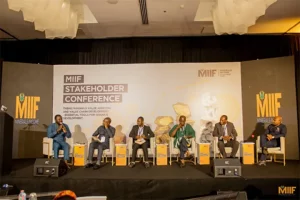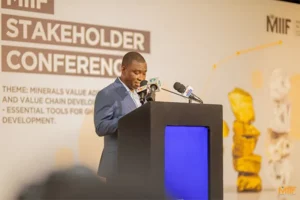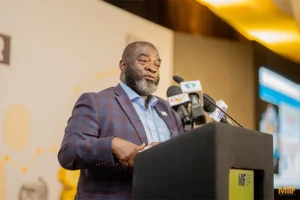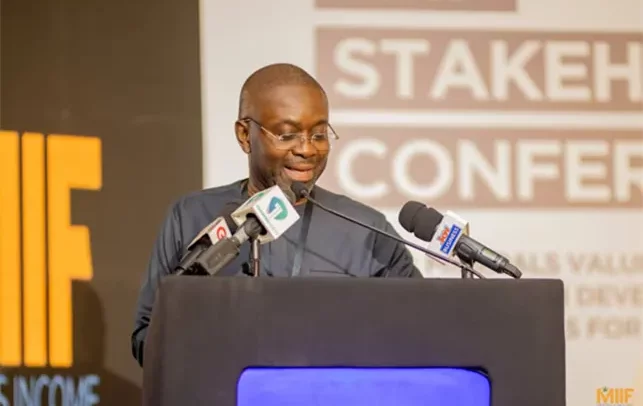The Minerals Income Investment Fund (MIIF) hosted the highly successful second MIIF Stakeholder Conference at the Marriott Bonvoy Hotel on 15th October 2024. The event, themed “Minerals Value Addition and Value Chain Development – Essential Tools for Ghana’s Development,” provided a crucial platform for discussions on enhancing Ghana’s mining sector through value addition, governance, and sustainable practices.
Bringing together key stakeholders, including government officials, industry leaders, civil society organizations, policymakers, the media etc. the conference served as a collective effort to explore how Ghana can capitalize on its mineral wealth to drive long-term economic growth.
Mining: The First Pillar of Ghana’s Economy
Opening the conference, Edward Nana Yaw Koranteng, CEO of MIIF, reminded attendees of MIIF’s mandate, saying, “It is important to rehash what MIIF is and the role we play and also some of the strides we have made. The Minerals Income Investment Fund was set up by statute (Act 978) in 2018 with a three-pronged mandate.
- Receive and manage mineral royalties on behalf of the government.
- Manage the equity interest of the state in all large-scale mines in which the State has a carried interest and
- Invest the royalties on behalf of the people in a transparent, beneficial, accountable, and sustainable way.
He also emphasized that the Fund’s mandate is underpinned by the vision to make mining the first pillar of the Ghanaian economy by investing in value addition for every single mineral type, increase Ghanaian equity in the mining majors and support the mining value chain towards an extensive localization of value which will create Ghanaian mining champions. “I believe we are on an upward trajectory in line with this vision, but a lot more needs to be done.,” Mr. Koranteng added.
MIIF’s Strategic Growth and Ambitious Future
Since its inception in 2018, MIIF has grown its assets from $180 million to over $1 billion. Mr. Koranteng shared MIIF’s ambitious vision for the future: “Over the next decade, we aim to grow our assets under management to $6 billion, creating sustainable generational wealth for all Ghanaians. This growth will be driven by our investments in value addition, technology, and expanding our royalties net.”
He also outlined MIIF’s key investment initiatives, including a $60 million investment into Ghana’s burgeoning lithium and salt industries. “Our investments in lithium and salt position Ghana as a leader in critical minerals essential for the global shift towards renewable energy and electric vehicles. We are setting a model for other African nations to follow,” Mr. Koranteng noted.
Expanding the Royalties Net
Mr. Koranteng announced MIIF’s strategic framework agreement with the Ghana Revenue Authority (GRA), Ghana Standards Authority, Minerals Commission (Mincom) and EOCO to ensure that all mining companies meet their royalty obligations. “We are using technology to track production levels and ensure compliance from mining companies. This will expand our revenue base, increasing the funds available for reinvestment into the sector,” he explained.
He further shared MIIF’s plans to introduce a dividend payout policy that ensures financial independence for the Fund and streamlines payments to the Government. “This policy will cement MIIF’s independence,” Mr. Koranteng emphasized.
Collaboration for Sustainable Growth and Value Addition
A recurring theme throughout the conference was the importance of mineral value addition. Honourable George Mireku Duker, Deputy Minister of Lands and Natural Resources, underscored the need for Ghana to focus on processing minerals locally. “By focusing on refining and adding value to our minerals before exporting, we can retain a larger share of the economic benefits and reduce our reliance on raw mineral exports,” Hon. Mireku Duker said.
The Minister further stressed that local content policies must be enforced to ensure that Ghanaian businesses and entrepreneurs play a central role in the mining sector. He encouraged MIIF to explore value addition opportunities across the mining sector, urging the Fund to work with the private sector and the Ghana Geological Survey Authority to establish a mineral exploration fund. “Our aim is to set up downstream industries in mining catchment areas, creating jobs and enhancing local economies. MIIF must continue its role as a catalyst in supporting local entrepreneurship,” he added.
Additionally, the Minister stressed the need for MIIF to create a more advanced system for tracking production along the mining value chain to ensure proper reconciliation of mineral royalties owed to the State. He urged MIIF to collaborate with relevant government ministries, including Lands, Finance, and National Security, to combat gold smuggling and the illicit financing of mineral projects.
Africa’s Critical Role in Global Mineral Supply Chains
A key presentation at the conference was delivered by David Ofosu-Dorte, Senior Partner at AB & David, who spoke on the importance of leveraging Africa’s mineral resources in value-added global supply chains. “Africa has always been rich in resources, but we must be intentional in adding value and taking our rightful place in the global supply chain. The Africa Mining Vision and Agenda 2063 provide a framework for achieving this through regional cooperation and innovation,” Ofosu-Dorte remarked.
He emphasized the importance of Ghana’s leadership in showcasing how African nations can turn raw minerals into high-value products that drive local industries and create jobs. “MIIF’s role is critical in ensuring that Ghana’s mining sector becomes a model for others to follow, with a focus on value addition, sustainability, transparency, and innovation,” he added.
Stakeholder Engagement: A Path to Responsible Resource Management
The conference also emphasized the significance of stakeholder engagement in ensuring that Ghana’s mineral resources are managed responsibly. The panel discussion, moderated by Dr. Kwasi Ampofo, Head of Metals and Mining at BloombergNEF, further explored the theme of the Conference. On the panel were Edward Nana Yaw Koranteng, CEO of MIIF, Mr. Frederick Attakumah, Ghana Country Director of Asante Gold Corporation, Kwaku Ampromfi, Group CEO, McDan Group, Denis Gyeyir, Africa Senior Programme Officer at the Natural Resource Governance Institute, and Dr. Steve Manteaw, Co-Chair of the Ghana Extractive Industry Transparency Initiative (GHEITI). The conversations focused on value addition to Ghana’s minerals resources, with the panel calling for more transparency in the investments and initiatives of the Fund.
Denis Gyeyir, Africa Senior Programme Officer at the Natural Resource Governance Institute (NRGI), praised the policy initiative but urged for an amended MIIF Act to institutionalize good practices. He highlighted the importance of reforms to avoid past mistakes, particularly referencing Ghana National Petroleum Corporation (GNPC) Explorco’s issues with dividend payout due to the absence of a clear policy. “The dividend payout policy is critical,” Mr. Gyeyir remarked. “We’ve seen it with GNPC Explorco, where government interests in oil blocks were handed over without the proper payout structure in place. We need to learn from
The panel also highlighted successful case studies from other countries, showing how responsible mining practices can lead to sustainable development. “Ghana has a unique opportunity to demonstrate that mineral wealth can be managed in a way that benefits everyone while protecting our natural resources,” the panel concluded.
Support for Local Entrepreneurs and Expanding Industries
In line with its mandate to support local businesses, MIIF’s GHS25 million investment in Injaro Ghana Venture Capital Fund, a company providing financial backing to firms in the mining supply chain, was highlighted as a key initiative. “This investment enables local companies to access funding, compete with international firms, empowering our entrepreneurs to take full advantage of the opportunities within the sector,” Mr. Koranteng stated.
A particular emphasis was placed on Ghana’s potential in salt production. “Companies like Electrochem have the potential to elevate Ghana into the ranks of the top 10 salt-producing nations,” Mr. Koranteng shared. He called for institutional support to ensure that local entrepreneurs succeed in this endeavour. “Our role at MIIF is to support these industries not only through financing but also by providing the governance and transparency needed for success.”

The Road Ahead: Building a Sustainable Future
Mr. Koranteng reiterated MIIF’s commitment to ensuring that Ghana’s mineral wealth drives long-term economic transformation. “The future is bright. With our strategic investments, expanding royalties net, and focus on sustainability, MIIF will continue to play a key role in Ghana’s economic growth. Our goal is not just wealth creation for today, but sustainable generational wealth for all Ghanaians.”
As MIIF looks to the future, its efforts will remain focused on promoting transparency, fostering innovation, and ensuring that the benefits of Ghana’s mineral wealth are shared equitably across the nation.
As charged by President Nana Addo Dankwa Akufo-Addo, MIIF’s role extends beyond funding and equity positions in mines. The Fund is working to support the building of a fully-fledged mining industry with investments across the mining value delivery chain, including capacity building, capital markets, commodity trading, and research and development.
Conclusion and Next Steps
The MIIF Stakeholder Conference ended with a collective understanding that Ghana must do more to maximize the benefits of its natural resources through value addition, sustainable practices, and improved governance. Participants reiterated the need for collaboration between government, private sector players, and civil society to ensure that the wealth generated from Ghana’s mineral resources benefits all citizens.
The conference also called for ongoing stakeholder engagement to ensure that policies and initiatives reflect the needs of all parties involved. MIIF reaffirmed its commitment to working with stakeholders to drive value chain development, foster sustainable mining practices, and promote transparency in governance.

About MIIF
MIIF was set up by the Minerals Income Investment Fund Act, 2018 (Act 978) as amended to receive royalties from minerals accruing to government, invest those royalties to secure the future wealth of the country and also manage the equity interest of Ghana in large scale mining firms.
civil society to ensure that the wealth generated from Ghana’s mineral resources benefits all citizens.
The conference also called for ongoing stakeholder engagement to ensure that policies and initiatives reflect the needs of all parties involved. MIIF reaffirmed its commitment to working with stakeholders to drive value chain development, foster sustainable mining practices, and promote transparency in governance.
Visit www.miif.gov.gh for more information.
For further enquiries, call Business Development on 0201855601 | 0201855633 | 0201855603
From left to right: Dr. Kwasi Ampofo, Head of Metals and Mining, BloombergNEF (moderating the panel conversation); Edward Nana Yaw Koranteng, CEO of MIIF, Mr. Denis Gyeyir, Africa Senior Programme Officer, Natural Resource Governance Institute; Dr. Steve Manteaw, Co-Chair, Ghana Extractive Industry Transparency Initiative (GHEITI); Mr. Frederick Attakumah, Ghana Country Director, Asante Gold Corporation; Mr. Kwaku Ampromfi, Group CEO, McDan Group.

Edward Nana Yaw Koranteng, the Chief Executive Officer of the Minerals Income Investment Fund (MIIF) opening the Stakeholder Conference with his remarks.
Hon. George Mireku Duker, Deputy Minister of Lands and Natural Resources, giving his remarks at the Stakeholder Conference.
David Ofosu-Dorte, Senior Partner, AB & David Africa, presenting on the theme of the Conference: “Minerals Value Addition and Value Chain Development- Essential Tools for Ghana’s Development.”


